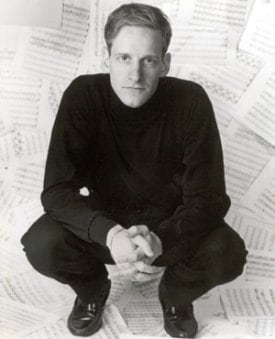Natural Born Composer: Lowell Liebermann
 |
Yamaha Piano artist Lowell Liebermann
|
Although he both conducts and performs regularly, Liebermann considers himself a composer first and foremost. "I never wanted to be a concert pianist," he adds whose duties as a performing pianist keep him traveling often cutting into his writing schedule. "Interestingly, I perform more than I used to it's very important to keep in touch with what a performer has to experience.
"Many of those who only 'compose' often write in ivory towers, where it's all very intellectual and rigid," he continues, "totally forgetting about the joy and physical pleasure of performing and about the joy of interacting with other musicians. That's the most important aspect, the interaction. If some composers had to play the music that they wrote, they'd write very differently."
Liebermann's youthful compositions are inspired by such composers as Dmitry Shostakovich, Frank Martin, and the later works of Franz Liszt. "I'd be hard-pressed, now being older, to say who my most important influences are," he adds. "Once you find your 'voice,' the music takes over and goes where it wants to.
"My ultimate goal is to simply create beauty. I'm tired of the cliché about art having to reflect its times. You know, 'It's a Horrible World We Live In' so you get all of this politically- and socially-engaged art, much of which is social propaganda masquerading as art. To me, at least the music I like is very abstract and it's about creating something of beauty."
In October, The American Ballet Theatre presented Piano Concerto No. One, and enjoyed the distinction of being the first major company to perform a ballet based upon a Lieberman composition.
In January 2003, Liebermann will perform his Quintet for Piano and Strings Op. 34 in Berlin with members of the Berlin Philharmonic. A third piano sonata, commissioned by the American Pianists Association and written for pianist James Giles, is also in the works, and is scheduled to premiere at Wigmore Hall in London in April.
"My earliest composition teacher told me, 'Music is a very difficult field, and a very difficult life. You'll never make money writing. You'll be unperformed and have to teach,'" he recalls. "But I was stubborn and thought, 'No, this is how I'll make my living, and it feels that I have been able to live solely on composing. I consider myself very, very lucky."
For more information, write Yamaha Corporation of America, Piano Division, P.O. Box 6600, Buena Park, CA 90622; telephone (714) 522-9011 or email infostation@yamaha.com.
 |
| © 2010 Yamaha Corporation of America. All rights reserved. |
